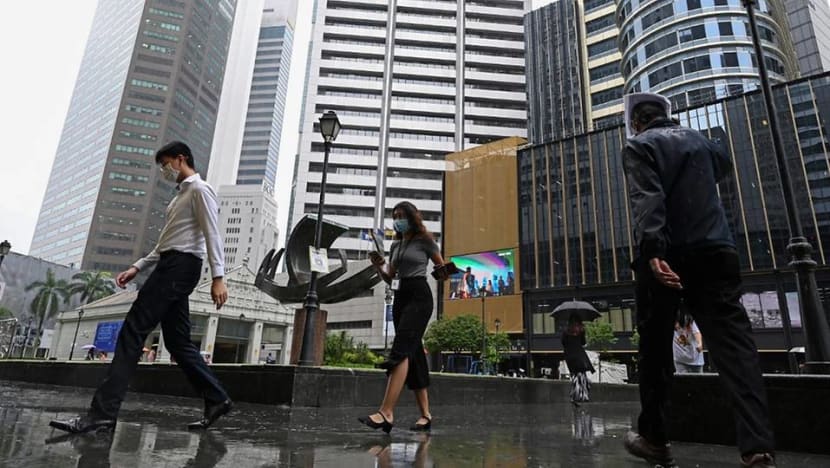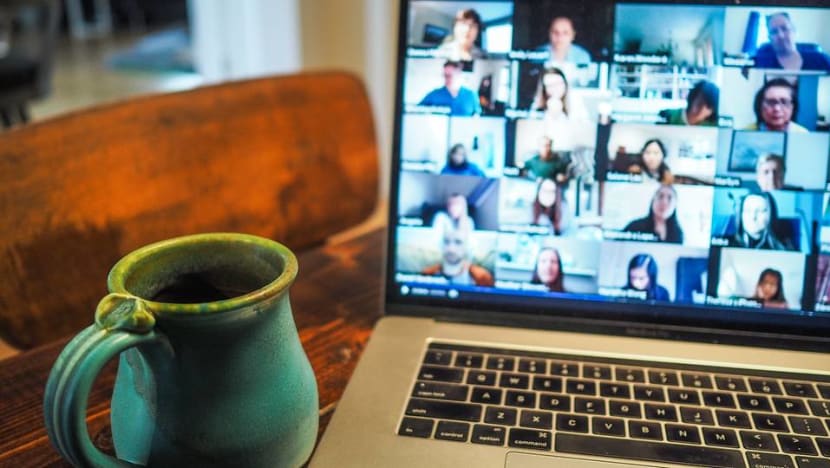commentary Commentary
Commentary: Hybrid working may change contractual terms and conditions for employees
Some countries have already implemented laws to mitigate new risks associated with a hybrid work model and companies here may follow suit, says lawyer Amarjit Kaur.

(Photo: Unsplash/Annie Spratt)
SINGAPORE: Certain countries, such as the Netherlands, have had a head start in putting in place hybrid working legislation, well before COVID-19 brought homeworking to the forefront, to protect the interests of both the employer and its employees.
Such legislation typically regulates flexible working arrangements including working hours, working times and places of work.
Employers may deny requests for flexible working for compelling business interests such as security issues, work schedules or financial and organisational problems.
Such legislation is also intended to ensure that there is no discrimination against those who opt to work from home to overcome the traditional social stigma surrounding those who work from home.
This is critical to ensure that equal rights and opportunities are afforded to those opt to work from home.
READ: Commentary: What if people don’t want to return to the office?
In Singapore, employers are seriously considering such a hybrid model of working as the way forward. For many, this could mean working from home for part of the week and working in the office the rest of the time.
Minister in the Prime Minister’s Office Indranee Rajah's exhortation to employers to consider offering staff a hybrid work arrangement beyond COVID-19 to allow them to attend to elderly parents or young children, has also been met with broad support and approval.
READ: Commentary: Sitting way too much can affect your moods too
Banks like DBS Group, Citigroup Inc and Mizuho Financial Holdings News, for example, are paring down office space as they transition to hybrid work - showing that the decentralisation is here to stay, especially given the trend of rapid digitalisation.
Can employers keep up with these changes from a legal perspective however and how will that impact employees?
PHYSICAL WELL-BEING AND SAFETY
According to Singapore’s labour laws, employers bear the burden of ensuring a safe workplace. But how are employers meant to protect the health and safety of employees who are not working out of a physical workplace within their control?
Minister of State for Manpower Zaqy Mohamad confirmed in Parliament in June 2020 that work from home arrangements do not change an employer's responsibility for work injury compensation.

The firm will have to ascertain that the injury arose while the employee was performing work activities at home.
This is easier said than done and can have serious ramifications for employers, who find themselves facing a novel situation of potentially being held responsible for injuries that occur in employees' homes, to which employers have no access, and over which employers typically exert no control.
An extreme yet entirely plausible example of this is as follows: During office hours, an executive, seated at his desk at home, takes a work-related call on his mobile. He gets up and walks across the room to retrieve a document needed for the call, trips over his toddler’s toys and fractures his foot. It almost seems absurd to even suggest any liability on the part of the employer, but could it be argued that the executive was injured "on the job"?
Since the Workplace Safety and Health Act's application to remote working is untested, responding to complaints and actions for work-related injuries and illnesses will be challenging.
READ: Commentary: Spate of workplace deaths and what needs addressing in Singapore's safety culture
When employees are working outside the office, it may be less clear when an act is performed in the course of employment.
To limit their liability for such accidents, some companies have started to carry out occupational safety assessments in employees' homes to identify risks and measures to mitigate these risks, whether by way of physical inspections, via Zoom or over an app.
This must be balanced against employee's rights to privacy and should be subject to prior notification and agreement. Employers are thus modifying their policies to contractually provide for such potential intrusions.
Employers may also follow the example of France, which has rolled out self-assessment forms to be completed by employees in respect of occupational risks related to working from home.
In Belgium, legislation has been enacted to ensure that teleworkers are covered by occupational accident insurance if the accident occurs at home, during working hours and in a place listed as a workplace in the contract.

In Singapore, companies such as Salesforce and Autodesk are adopting a variety of measures to mitigate their liability, including providing employees with a technology budget to ensure they have proper and ergonomic equipment at home.
Employers are also clearly stipulating working hours, rest days, overtime and other terms that remote-working employees must abide by in order to avoid claims of breaches of the Employment Act by employees, given that working times are less defined in a homeworking environment.
EMPLOYEES’ MENTAL WELL-BEING
Employers are potentially facing the reverse challenge of ring-fencing employees' personal and home lives from the increasing encroachment of work – which have led to complaints of depression, anxiety and burnout.
READ: Commentary: Here’s a way to avoid Zoom burnout – revert to good old phone calls
READ: Commentary: We’re sleeping more since the pandemic, but we aren’t feeling rested
A survey by National University Health System's (NUHS) Mind Science Centre on mental health resilience revealed that 61 per cent of those working from home reported feeling stressed, more than the 53 per cent of front liners in the pandemic feeling likewise.
This could also be due to the higher incidence of domestic issues employees may face while working from home. AWARE saw a drastic 116 per cent increase in domestic violence helpline calls by April 2020 from a year ago while the police reported a 22 per cent jump in monthly average cases of family violence during the circuit breaker.
Remote working poses a significant and unique challenge to employers seeking to support and promote mental health in their workforce given that it is much harder to assess how their employees are coping from a distance.

It has been suggested that companies consider investing in wearable tech to collect data on the mental health of their workforce and measure stress responses, subject to data protection of sensitive health data.
The Tripartite Advisory on Mental Well-Being at Workplaces, introduced in November 2020, educates employers on progressive ways in which they can support employees’ mental health, such as providing access to external counselling services. While laudable, the advisory lacks bite and doesn't compel employers to adopt the suggestions.
A more concrete commitment would be to expand the list of Occupational Diseases under the Work Injury Compensation Act (WICA), to include mental health illnesses related to work stress, which would have the effect of holding employers accountable.
It would also be a positive step forward to recognise certain mental health issues as being a form of disability, which should be a protected characteristic when it comes to discrimination.
READ: Commentary: Our unhealthy ideas about work are worsening our workaholism problem
READ: Commentary: Being forced to log on to work from home created stress and fatigue for workers
Countries such as Italy, Ireland, and the Philippines, have promulgated "right to disconnect" laws on answering work calls and emails outside of office hours to prevent employee exhaustion and burnout.
Member of Parliament Melvin Yong also mooted this in Parliament in October 2020, given that employee burnout complaints have heightened during the pandemic. However, would it be practical across different industries, or be seen as overly prescriptive?
In the interim, it is crucial that companies put in place measures, benefits, and policies to safeguard their employees' long-term mental health, taking into account the unique stressors posed by hybrid working.
Companies such as LinkedIn, Cisco, Google and Thomson Reuters offer firm-wide mental health holidays for staff to unplug and recharge in the face of soaring burnout rates. Companies have also offered resilience training, guided meditation and well-being sessions, including for remote employees.
INFORMATION SECURITY AND CONFIDENTIALITY
Besides the people challenges, there’s also the technology-related issues. Remote working questions how employers can protect their data and confidential information as the ingress and egress of third parties to such remote locations isn't secure and tightly controlled by the company.
When the circuit breaker hit, companies scrambled to provide employees with the necessary technology and equipment to facilitate remote work with little time to deep dive into the security implications of remote working.

So, companies may have allowed employees access to customer and other data, heightening the risk of leakage of such sensitive information, whether by shoulder surfing or eavesdropping of spouses or visitors to the house, employees leaving physical copies of documents lying around and viewed by unauthorised parties.
Allowing remote workers to access company networks through homeworking environments also introduces vulnerabilities to cyberattacks.
In a paper released by the MAS and the Association of Banks in March, risks in areas such operations, technology and information security, fraud and staff misconduct and legal and regulatory risks were flagged for attention and recommended preventive and detective measures, including staff surveillance for high-risk activities.
READ: Commentary: Workplace surveillance may hurt us more than it helps
Companies may thus introduce new policies to safeguard their data privacy and cyber-security by regulating staff remote working behaviour, including prescribing locations where staff are not permitted to work remotely such as in shared public working spaces like cafes and hotel lobbies.
Otherwise, they risk facing complaints and actions for breaches of confidential information, under the Personal Data Protection Act, and other requirements on the use, disclosure, retention and processing of personal data.
Given that our working landscape is changing, companies will need to put in place the necessary policies and procedures to mitigate new risks. Workers need to be ready for that.
Listen to EngageRocket CEO Leong Chee Tung and HR strategist Adrian Tan debate the merits of returning to the office on CNA's Heart of the Matter podcast published in 2020:
Amarjit Kaur is a Partner at Withers KhattarWong in its litigation and arbitration team. She has been noted for her expertise in labour and employment law in the 2020 edition of The Legal 500: Asia Pacific.












